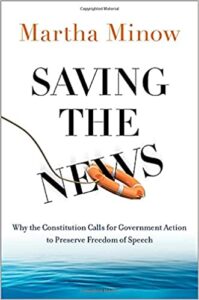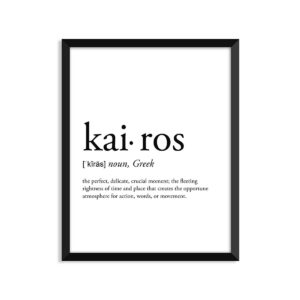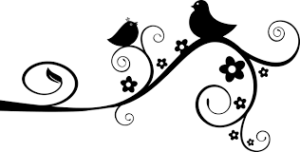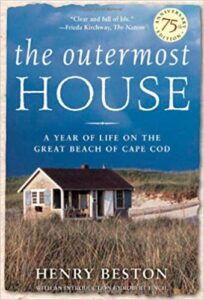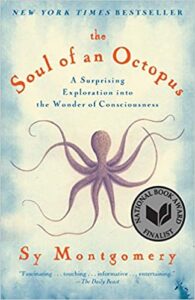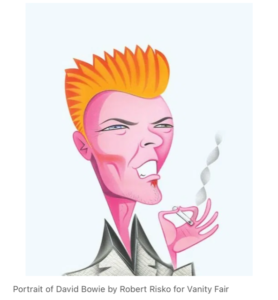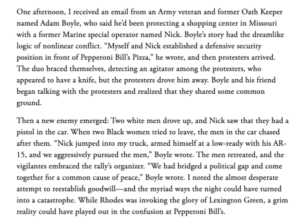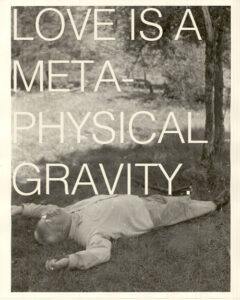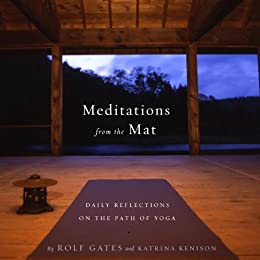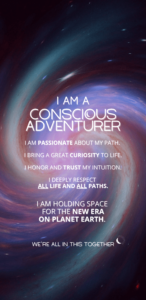The Dissident, Cyber Warfare & Justice
July 30, 2021#JusticeForJamal
THE DISSIDENT
Briarcliff Entertainment
“From the Academy Award-winning director of Icarus, Bryan Fogel, comes the untold story of the murder that shook the world.”
(You’ll want to see it…twice. #MustSee Bryan and his team, although debuting at Sundance to standing ovations and top 10 lists, could not find a distributor for eight months because, you know, Saudi Arabia. Please purchase the film and support the filmmakers, the distributor, Briarcliff, and Jamal. -Dayle)
Then, watch the podcast with Rich Roll and Bryan Fogel, particularly at the 1:20:00, ‘How cyber warfare has become a major threat…’
From the site: “Oscar-winning documentary filmmaker Bryan Fogel joins Rich to discuss his new film ‘The Dissident’ a candid portrait of Saudi journalist Jamal Khashoggi and the bone chilling events surrounding his murder.”
For more and how to take action:
From the site: “As of 2021, dozens of journalists are currently detained in Saudi Arabia. Journalists, Jamal Khashoggi was one of you. Keep his legacy and story alive by sharing his work widely and exposing the truth about MBS and his regime.”
The Academy Awards this year?
Managing the Shi(f)t
The main theme for August is “Managing the Shi(f)t”.
The first part of the month requires great flexibility, acceptance, compassion, and resilience to deal with unexpected and sudden changes whether in yourself or in others. It may look grim at the beginning but we are moving forward into calmer waters that will provide more stability, inspiration, rational thought and clarity as we anchor ourselves into a brighter landscape.
Old emotional and habitual patterns are still bubbling to the surface for forgiveness and expulsion. We get to see where we have been wasting our energy on worry, regret and blame. Old habits of judgment, feeling powerless, victimized, and limited in what we can create have eroded our motivation and bred despair, anger, resistance and negative attitudes towards life. If you get stuck there, and are unwilling to let the past go and accept where the tide is moving, you will be miserable.
On the other hand, if you are willing to open to more trust in the positive and optimistic view of the big picture, you can completely turn anything negative and limited in your life around. The clearing of old trauma in any and many ways is a very useful practice this month. (There is a good exercise on the monthly support audio to help with the understanding and clearing of trauma or “susto”.)
This will require an open heart and the discipline of trust even though you may not have instant feedback from your prayers and intentions. There may be a lag time that tests you. You may not see or experience results that you are on the right track and you may need to go deep into your own intuition for confidence and confirmation. And, if you continue to come across obstacles and challenges along the way, look to what is not yet cleared in your field or where you are still holding on to something in your past, rather than how the universe may not be supporting you at this time.
Remember that in order to bring your vibration up and move to that next level, you need to make space. Creating space for the abundance available later in the month demands paying attention to your habitual reactions, habits and judgments so you can clear and change them to a better alignment.
The most important thing is to stay out of blame, especially when you are accommodating a change that you did not initiate. Acceptance and neutrality go a long way to ease the discomfort of this experience.
We are definitely in a transition time and a huge shift in consciousness and vibration.
Curiosity, optimism, creativity and humor should be a major part of the management team you build to navigate this month and the months to come. Take responsibility for your own shi(f)t, and stay in your own lane with regards to where others are in their own navigation. Once we get through the potentially cranky new moon on the 8th, we have our work cut out for us. If we do it well, there are many gifts awaiting us as we move into the last part of the month.
What is the “work”?
Courage to tell the truth. Courage to let go. Courage to forgive. Determination to trust. Discipline to stay out of blame. Compassion for yourself and others. Acceptance and cooperation regarding change not initiated by you. Keeping your vibration high no matter what through beauty, inspiration and strong spiritual practices. Staying in your own lane and out of other people’s drama and negativity. Trusting your intuition, your inner guidance, and having the courage to go for what is right for YOU. Taking full responsibility for your own shi(f)t.
How the rest of the month shows up:
https://thepowerpath.com/monthly-forecast/august-2021-monthly-forecast/
“The constitution is not a suicide pact.”
July 27, 2021“We can and must do more to regulate and support distribution of reliable news.”
CNN public editor: Why CNN’s audience deserves federally regulated news
by Ariana Pekary
Ariana Pekary is the CJR public editor for CNN. She was an award-winning public radio and MSNBC journalist for two decades. Now she focuses on the systemic flaws of commercial broadcast news. She can be contacted at publiceditors@cjr.org.
CNN, AS I’VE WRITTEN BEFORE, has amplified disinformation, relies on panel discussions that increase polarization, and has neglected voices of moderation for the sake of ratings. But is there some way to mitigate such problems, which are so common in cable news? Martha Minow, a professor at Harvard Law School, argues that the Constitution requires efforts to protect the free press––including regulation.
In Saving the News, Minow describes the merits of “deep and extensive government involvement in funding, shaping, and regulating media.” Some may balk at the notion of federal intervention in the news. But Minow chronicles how the government has granted newspapers low postal rates, invested in research that created the internet, established licensing protocols for broadcasters, and regulated telephone lines and features of digital platforms––involving itself in essential elements of the nation’s media infrastructure.
“If the ecosystem fails to provide necessary information to citizens,” she told me, “then democracy dies—and the Constitution is not a suicide pact.”
Minow argues that the First Amendment implies the existence of a functional press, so the government has an obligation to enact reforms and regulations to protect it. Many consider the industry to be a public utility, and therefore subject to regulation. And, as Minow explains in Saving the News, “Regulation of a necessary good or service also helps guard against coercion that works by exploiting people’s dependence, but it still permits private owners to operate for profit.”
The now-defunct Fairness Doctrine, which mandated journalistic balance by requiring broadcasters to air multiple viewpoints, is one example of successful oversight, Minow said. Supreme Court justices wrote in 1969 that it was a “protection for ‘the right of the viewers and listeners, not the right of the broadcasters.’ ” Public interest, Minow notes, is a vital characteristic of government intervention. Accordingly, we may deduce that the public has authority over an outlet like CNN to protect the audience.
The United States has a long, if forgotten, history of funding the news media.
In The Death and Life of American Journalism, Robert McChesney and John Nichols––cofounders of Free Press, a media reform group––calculated that “the level of government subsidy given to the American press in the 1840s was the equivalent of $30 billion in 2010 dollars.” But federal funding of public media amounted to just $465 million in 2020––an extraordinarily low amount compared with other countries.
Subsidizing public media, Minow told me, would “provide crucial competition and can stimulate for-profits to win viewers by doing better.” Sesame Street, for example, did not exist before broadcasters knew that the format would be popular. Now it’s competitive and profitable. We could use other public-private partnerships, similar to the current collaboration with ProPublica, to create new informative TV programs, she says, calling it a “public option” for journalism.
Other possibilities include tax incentives; for instance, if CNN adopted a certain set of ethical standards (see the Society of Professional Journalists’ as an example), then it could receive tax benefits for implementing procedures in the public interest. Minow said the government could also encourage measures to label news programming, to more clearly “distinguish news, analysis, and opinion.”
As a democratic nation, we may have lost sight of the need for an informed electorate. Commercial outlets dominate our media environment. But in Saving the News, Minow reminds us of our constitutional obligations. We can and must do more to regulate and support distribution of reliable news. CNN’s audience deserves it. All American audiences do.
The Society of Professional Journalists is the former Sigma Delta Chi, founded at DePauw University.
The Year Earth Changed
July 26, 2021‘Narrated by David Attenborough, this timely documentary special takes a look at nature’s extraordinary response to a year of global lockdown. This love letter to planet Earth will take you from hearing birdsong in deserted cities for the first time in decades, to witnessing whales communicating in ways never before seen.
Produced by BBC Studios Natural History Unit, directed by Tom Beard, and executive produced by Mike Gunton and Alice Keens-Soper.’
AppleTV+
“One of the first documentary reflections of our strange times.”
Dayle, here. At once heartbreaking and hopeful. Not hopeful in a passive sense, as in ‘some day,’ but now. Together. Living not in dominance over, but interconnection with our planet, our species, all living beings.
Pause.
Reflect.
Our planet is gorgeous, alive, breathing. Pulsing with birth.
And it is burning. We are destroying it in present tense.
Life is being extinguished. We saw how the earth changed in days, weeks, and months early in global lockdowns WITHOUT the interaction of our destructive beings…humans. Carl Jung: “Man won’t deviate the original pattern of his being.” Is this, then, destruction?
We can give permanent pause, space, quiet, and tender mercies in our practices and consciousness, asking, what can I do in my corner of the sky? (Nod to Valarie Kaur.)
We must.
I had so much hope for our planet, for each other, in the early days of this current pandemic, our isolation. It quickly faded when the pause became political, when health and care became virtue signaling, when science became overridden by misinformation, disinformation, and propaganda, hate, disorder, power, and greed.
As a collective human body the focus became on getting ‘back to normal’ instead of shifting to what’s possible. What’s necessary.
We’re on the edge, balancing destruction with possibility. Let’s choose possibility. All of us.
The food we eat.
The cars we drive.
The Energy we use.
The resources we deplete.
The privilege we strive to achieve at the expense of other.
I want to believe there is still time.
And I want to protect all that thrived when we were silent and away.
Let’s give Gaia a chance to live, heal, and breathe. She’s given us so many.
In the silence, did you hear? Did you hear the birdsong? Did you see the animals congregate and communicate? Did you know the whales could hear again? The Himalayas could be seen again?
The future of the natural world is co-existing. We must do the one thing we can do, interconnected, to shift the planet back to health, as we inadvertently did in our absence, the year earth changed.
#
From Maria Popova, sharing a BBC interview with Carl Jung from 1959:
“…the only danger that exists is man himself — he is the great danger, and we are pitifully unaware of it. We know nothing of man — far too little. We are the origin of all coming evil [30:27].”
John Freeman and his team filmed the interview at Jung’s house at Küsnacht (near Zurich, Switzerland) in march 1959, it was broadcast in Great Britain on october 22, 1959. This film has undouptedly brought Jung to more people than any other piece of journalism and any of Jung’s own writings. Freeman was deputy editor at the “New Statesman” at the time of the interview. They formed a friendship, that continued until Jung’s death. -posted by ‘peacefulness’ on YouTube.
Jung: “We need more psychology, more study of human nature.”
We need Gaia’s nature, she does not need us. -dayle
Stardust & Consciousness
July 25, 2021Fr Richard Rohr:
Living in a transitional age such as ours is scary: things are falling apart, the future is unknowable, so much doesn’t cohere or make sense. We can’t seem to put order to it. This is the postmodern panic. It lies beneath most of our cynicism, our anxiety, and our aggression.
Chaos often precedes great creativity, and faith precedes great leaps into new knowledge. The pattern of transformation begins in order, but it very quickly yields to disorder and—if we stay with it long enough in love—eventual reordering. Our uncertainty is the doorway into mystery, the doorway into surrender.
Center for Action and Contemplation teacher Barbara Holmes:
The crisis begins without warning, shatters our assumptions about the way the world works, and changes our story and the stories of our neighbors. The reality that was so familiar to us is gone suddenly, and we don’t know what is happening. . . .
If life, as we experience it, is a fragile crystal orb that holds our daily routines and dreams of order and stability, then sudden and catastrophic crises shatter this illusion of normalcy. . . . I am referring to oppression, violence, pandemics, abuses of power, or natural disasters and planetary disturbances. . . .
I consider crisis contemplation to be an aspect of disorder that prepares communities for a leap toward the future. This is a leap toward our beginnings. We are not just organisms functioning on a biological level; our sphere of being also includes stardust ☆ and consciousness. We all have a spark of divinity within, a flicker of Holy Fire that can be diminished, but never extinguished.
Knock Knock,
who’s there?
Mystery and Surrender.
Please, invite me in.
- Order
- Disorder
- Reorder
“Chaos often precedes great creativity.”
K
A
I
R
O
S
“People are attracted to that that makes them feel love.”
-Marriane Williamson, A Course in Miracles
Try. Intersect great ℒℴve love with great surrender.
Inhale.
jai
A meditation from Megan McKenna on the importance of translation. Scholar and author Neil Douglas-Klotz has worked for decades with the Aramaic language, which Jesus most likely spoke as a first-century Jewish man from Nazareth. Because translation is never an exact science, Dr. Douglas-Klotz offers several possible understandings of Jesus’ teaching “Blessed are they that mourn, for they shall be comforted.”
Blessed are those in emotional turmoil; they shall be united inside by love.
Healthy are those weak and overextended for their purpose; they shall feel their inner flow of strength return.
Healed are those who weep for their frustrated desire; they shall see the face of fulfillment in a new form.
Aligned with the One are the mourners; they shall be comforted.
Turned to the Source are those feeling deeply confused by life; they shall be returned from their wandering.
Dr. Douglas-Klotz continues:
Lawile can mean “mourners” (as translated from the Greek), but in Aramaic it also carries the sense of those who long deeply for something to occur, those troubled or in emotional turmoil, or those who are weak and in want from such longing. Netbayun can mean “comforted,” but also connotes being returned from wandering, united inside by love, feeling an inner continuity, or seeing the arrival of (literally, the face of) what one longs for.
Dr. Douglas-Klotz offers this embodied prayer practice to help readers sense the powerful message of this beatitude.
When in emotional turmoil—or unable to clearly feel any emotion—experiment in this fashion: breathe in while feeling the word lawile (lay-wee-ley) [longing]; breathe out while feeling the word netbayun (net-bah-yoon) [loving]. Embrace all of what you feel and allow all emotions to wash through as though you were standing under a gentle waterfall. Follow this flow back to its source and find there the spring from which all emotion arises. At this source, consider what emotion has meaning for the moment, what action or nonaction is important now.
Mary of Magdala
July 22, 2021‘…the first great bough, the fruit of love & compassion, the foundation of all things.’ -Mary Magdalene ღ
Today, the feast day of St. Mary Magdalene.
Today is the feast day of St. Mary Magdalene, one of the most misunderstood of all saints. In this excerpt from A Jesuit Off-Broadway, I relate her (true) tale and how her life intersected with that of the gifted actress who would portray her in the play “The Last Days of Judas Iscariot.”
America/The Jesuit Review
Who was Mary of Magdala?
by James Martin, S.J.
One of the note cards from the cathedral gift shop in Los Angeles struck a chord with the actress Yetta Gottesman, because it depicted her character, Mary Magdalene. The delicate tapestry presented a young woman with close-cropped black hair, her head bowed in prayer, her hands clasped to her chin.
Thanks in great part to Dan Brown’s best-selling novel The Da Vinci Code, interest in the historical Mary Magdalene has risen stratospherically during the past few years. As with her fellow disciple, Judas, we know very little about her. Jesus cast seven demons out of her (we don’t know how these demons had manifested themselves in her behavior); she remained at the cross with two other women when the other (male) disciples had all fled; she watched Jesus die; and she was the first one to whom Jesus appeared after the Resurrection. In a touching scene on Easter morning, a grieving Mary initially mistakes the risen Jesus for the local gardener.
Even with these distinguished credentials, Mary Magdalene (the name means “of Magdala,” a town in Galilee) gradually became known as a prostitute, though there is no mention of this in the Gospels. (The word maudlin comes from her name, presumably the result of her grieving for a sinful past.) The most benign explanation for this confusion over Mary’s identity is that there is a veritable crowd of Marys in the Gospel stories (besides Mary, the mother of Jesus, there is Mary of Bethany and Mary, the wife of Clopas). Mary Magdalene was also, oddly, conflated with a woman who had bathed Jesus’ feet with her tears, dried them with her hair, and then anointed them with oil. In AD 591, Pope Gregory I preached a sermon in which he proclaimed, “She whom Luke calls the sinful woman, whom John calls Mary, we believe to be the Mary from whom seven devils were ejected according to Mark.”
This inaccurate identification became more or less church teaching for at least a millennium.
A less benign interpretation of this “confusion” is that the early church was threatened, even horrified, by the stunning example of a woman among the early disciples. Strictly based on the evidence in the Gospels, Mary Magdalene enjoyed an exalted standing. She was not only the first one to whom Jesus appeared after the Resurrection, but also the one who proclaimed the news of his resurrection to the other disciples, including those who would be the leaders of the early church communities: Peter, James, Andrew, and the rest.
Thus comes Mary’s traditional title: “Apostle to the Apostles.” Her fidelity to Jesus during the Crucifixion, as well as Jesus’ appearance to her, are marks of distinction that place her, at least in terms of her faith, above the men. Some of the “extracanonical,” or “apocryphal,” gospels (that is, those not included by the early church councils with the traditional four Gospels) picture her as the most favored of all the disciples. “[Christ loved] her more than all the disciples,” says the text known as The Gospel of Philip.
Full read:
https://www.americamagazine.org/faith/2011/07/22/who-was-mary-magdala
[Image: Thomas Merton]
Cynthia Bourgeault:
“Mary Magdalene belongs to the great worldwide stream of spiritual awakening and has nothing whatsoever to do with organized religion.
If we are serious about activating Mary Magdalene’s wisdom presence within contemporary Christianity, the first step is to increase her visibility within the liturgy, particularly during Holy Week, where her presence is so crucial to understanding the Paschal Mystery as an act of redeeming ℒℴve.
I would like to see the entire Holy Week liturgy reframed around two parallel anointings…at Bethany and in the garden of the resurrection…which so powerfully convey the energy of transformative love.
Early Easter morning ceremonially enacted, rather than merely read, the gospel account of Mary Magdalene’s visit to the tomb. The basic ceremony, the Visitatio Sepulchri, has been around since the tenth century; it merely needs to be returned to active duty.
Mary Magdalene weaves into one whole cloth those strands that have traditionally been kept so stringently separated: conscious ℒℴve, healing, kenotic surrender, the feminine, singleness, transformation. To touch any part of the this hologram is to invoke all the rest.
We do not know for certain what happened to Mary Magdalene after the resurrection. The gospel bearing her name confirms that her spiritual leadership was honored in a least some circles of early Christianity. She may well have sojourned in France. What we do know for certain is that the fragrance of her presence did not disappear from Christianity. In mysticism and allegory, in art and folklore, in esoteric circles…all veiled, but pointing like a finger at the moon…her mysterious alchemical feminine was kept alive. Now at last, in our own times, it comes above ground again, asking us to awaken yet again to the morning of the resurrection and find ourselves in the garden, awaiting the encounter that can change our institutional hearts.
The imaginal realm is real, and through it you will never be separated from any one or anything you have ever loved, for ℒℴve is the ground in which you live and and move and have your being. This is the message that Mary Magdalene has perennially to bring. This is the message we most need to hear.”
‘In 591 Pope Gregory claimed that Mary of Magdala was a prostitute, a misconception that remains to this day. In 2016 she was named by the Vatican as the apostle of the apostles, their equal.’
-Written by Helen Edmundson and Philippa Goslett. Directed by Garth Davis.
https://www.rogerebert.com/reviews/mary-magdalene-2019
“As someone who watched it twice in 24 hours, ‘Mary Magdalene’ moved me in a way that no previous film about Christianity ever has.
Mary finds a place in the world and a cause in which to place her profound empathy. She was not just any spectator, this telling argues, so much as proof that at the core of Jesus’ teachings is a feminine influence.” -Nick Allen
[Must see.]
Buck Moon
POWER PATH
Full moon in Aquarius is Friday, July 23 at 8:36 PM Mountain Daylight Time (MDT).
Also known as the “Buck Moon”, this full moon opens opportunities to challenge beliefs, habits, how we view ourselves, how we see others, what we are putting up with, our thoughts, emotions and actions. Don’t be surprised if you are somewhat triggered during this time and needing to deal with something distasteful that comes to the surface. On the other hand, you could be hugely inspired by some inner momentum to do things differently and make exciting changes in your life. Embrace eccentricity and unique individuality in yourself and others and, whatever else happens, stay out of martyrdom, blame and judgment.
There is freedom being explored and if you can be, think, and act a bit unconventionally, you will harness some of the gift of this moon. Just don’t go overboard and say or do something overly impulsive you will regret later. This is a highly creative time where thinking outside the box and coming up with inspiring innovative ideas and solutions and then sharing them with others will have long lasting effects.
And let’s not forget the fun! Laughter, humor and a bit of wild abandon can help lift you out of feeling less than exuberant about life.
thepowerpath.com
“The brilliant host of On Being…”
July 20, 2021Inspired.
“We are apparently swimming in a reality unfolding moment by moment. The truly good news is that we are together. . . all forms of us.” -Pari Center, Italy, participant
Krista Tippett:
“We are living in a post 2020 world…for the rest of our lives.”
__
Anand Giridharadas is a journalist and writer. He is a former columnist and foreign correspondent for The New York Timesand a visiting scholar at the Arthur L. Carter Journalism Institute at New York University. He is the author of India Calling, The True American, and Winners Take All: The Elite Charade of Changing the World.
From Anand, 7.20.21:
“…got me thinking back to a conversation I once had with Krista Tippett, the brilliant host of On Being. And so today, on Billionaire Space Day No. 2, I share with you this brief reflection about the background ethos of the age…”
July 21, 1969, New York, New York: Rain-soaked New Yorkers watch TV and cheer as they see Apollo 11 astronaut Neil Armstrong’s first step on the lunar surface (Getty)
The.Ink
What we do alone and what we do together
On the billionaire space race
This is a story, in some ways, about two rival faiths. A faith in what we do alone versus a faith in what we do together.
These are two parallel and rival spiritual orientations. They are both very strong parts of our culture.
One tradition inspires the celebration of a heroic soloist, capitalist, pull-yourselves-up-by-the-bootstraps story.
But that’s never been the only story. We’ve also always had this story of movements. It wasn’t individuals who got rid of the King of England. The most important things we’ve done in this culture have been together.
These two tendencies, what we do alone and what we do together, have always vied for primacy in American life. For much of the 20th century, they lived in a certain healthy tension. And right now the relationship between them is very unhealthy. It’s become a relationship of mutual annihilation, instead of a relationship of adversarial cooperation.
I think we need to get back to a place where we understand both and celebrate both the very real heritage we have in this country of doing things alone and of doing things together, and the relationship that those things have.
Because at our best, we do things together in a way that allows people to do things alone. And people do things alone in a way that creates the opportunities to do things together. These things don’t have to be at war with each other, but they are absolutely at war today.
__
2018:
“This is a challenging conversation but a generative one: about the implicit moral equations behind a notion like “win-win” — and the moral compromises in a cultural consensus we’ve reached, without reflecting on it, about what and who can save us.’
We Americans revere the creation of wealth. Anand Giridharadas wants us to examine this and how it shapes our life together. This is a challenging conversation but a generative one: about the implicit moral equations behind a notion like “win-win” — and the moral compromises in a cultural consensus we’ve reached, without reflecting on it, about what and who can save us.” -On Being
From Krista Tippett on Twitter:
“…a lovely reflection, honored to be cited.”
Octopus Garden
Sy Montgomery, book recommendations:
Well, one of them I quoted from earlier. And that is “The Outermost House” by Henry Beston. There’s a quote from that book that is kind of the motto that I use when I write all my books. It says,
‘We need another and a wiser and perhaps more mystical concept of animals, for “the animals shall not be measured by man. … They are not brethren, they are not underlings. They are other nations caught with ourselves in the net of life and time, fellow prisoners of the splendor and travail of the Earth.”’
Ezra Klein
That’s beautiful, by the way.
From NYTimes columnist and podcast host Ezra Klein:
I’ve spent the past few months on an octopus kick. In that, I don’t seem to be alone. Octopuses (it’s incorrect to say “octopi,” to my despair) are having a moment: There are award-winning books, documentaries and even science fiction about them. I suspect it’s the same hunger that leaves many of us yearning to know aliens: How do radically different minds work? What is it like to be a truly different being living in a similar world? The flying objects above remain unidentified. But the incomprehensible objects below do not. We are starting to be smart enough to ask the question: How smart are octopuses? And what are their lives like?
Sy Montgomery is a naturalist and the author of dozens of books on animals. In 2015 she published the dazzling book “The Soul of an Octopus,” which became a finalist for the National Book Award in nonfiction. It’s an investigation not only into the lives and minds of octopuses but also into the relationships they can and do have with human beings.
This was one of those conversations that are hard to describe, but it was a joy to have. Montgomery writes and speaks with an appropriate sense of wonder about the world around us and the other animals that inhabit it. This is a conversation about octopuses, of course, but it’s also about us: our minds, our relationship with the natural world, what we see and what we’ve learned to stop seeing. It will leave you looking at the water — and maybe at yourself — differently.
Book recommendations:
The Outermost House by Henry Beston
The Old Way by Elizabeth Marshall Thomas
King Solomon’s Ring by Konrad Lorenz
__
Podcast link: https://www.nytimes.com/2021/07/13/opinion/ezra-klein-podcast-sy-montgomery.html
This, Ezra first:
And so it’s this idea that, oh, isn’t it interesting, octos have this completely different kind of cognition than we do and maybe think with their tentacles, and not with what we would think of initially as their brain. And we would never do that, but what a fascinating thing. Well, maybe we do do some version — a smaller version, probably — but of that. And then that’s probably true across a lot of these different pieces — that we, in fearing anthropomorphizing, we under-represent or refuse to admit how much we’re also animals, and have more animal forms of cognition than the post- Enlightenment rationalism that we tend to emphasize.
Sy Montgomery:
Bingo, Ezra, you got it. That’s absolutely right. We have been blinded to the genius of not only fellow animals, but fellow people for the longest time, just because we think everything has to be just like us. We didn’t even recognize the symptoms of heart attack in women because we were too busy focusing on men, because the doctors were all men for so long, for example.
So absolutely, I think that is the biggest mistake we are making in the world. And we’re not just making it in underestimating animals, but we underestimate fellow human beings as well.
NETFLIX:
A filmmaker forges an unusual friendship with an octopus living in a South African kelp forest, learning as the animal shares the mysteries of her world.
AP NEWS:
“My Octopus Teacher,” the tale of an eight-limbed creature and her human companion, has won the Oscar for best documentary.
The lifespan of a female octopus of the kind Foster met extends to only about 18 months. But that was enough time for him and his fellow directors Pippa Ehrlich and James Reed to be profoundly impacted by her.
“This really is a tiny personal story that played out in a sea forest at the very top of Africa. But, on a more universal level, I hope that it provided a glimpse of a different kind of relationship between human beings and the natural world,” Ehrlich said on the telecast.
Foster has said his relationship with the octopus taught him about life’s fragility and our connection with nature, and even helped him become a better father.
Reed thanked Foster at the ceremony, saying: “He kind of showed us if a man can form a friendship with an octopus, it does sort of make you wonder what else is possible.”
Under the sea
In an octopus’ garden
In the shade
And swim about
The coral that lies
Beneath the waves…
♡
Center for Action & Contemplation
July 10, 2021Praying the Lord’s Prayer
“Perhaps some of the most comforting words Jesus shared in Matthew and Luke’s Gospels are the prayer Christians call the Our Father or the Lord’s Prayer.
While the prayer is most often said in community or as part of ritual prayer, this prayer can also be a contemplative practice when prayed slowly and mindfully, perhaps even as lectio divina.
We invite you to pray this modern version of the prayer of Jesus from the Anglican Church of New Zealand, which both honors and reflects indigenous Maori culture.”
-Father Richard Rohr
❧
Eternal Spirit,
Earth-maker, Pain-bearer, Life-giver,
Source of all that is and that shall be,
Father and Mother of us all,
Loving God, in whom is heaven:
The hallowing of your name echo through the universe!
The way of your justice be followed by the peoples
of the world!
Your heavenly will be done by all created beings!
Your commonwealth of peace and freedom
sustain our hope and come on earth.
With the bread we need for today, feed us.
In the hurts we absorb from one another, forgive us.
In times of temptation and test, strengthen us.
From trials too great to endure, spare us.
From the grip of all that is evil, free us.
For you reign in the glory of the power that is love,
now and for ever.
Amen.
Om.
Shanti.
Church of the Province of New Zealand, A New Zealand Prayer Book, He Karakia Mihinare o Aotearoa (Collins Liturgical Publications: 1989), 181.
Proust
David Bowie:
What do you consider your greatest achievement?
Discovering morning.
Rediscovered with 4 am wake-ups for the Tour de France. ℒℴve.
~dayle
“In the 1880s, long before he claimed his status as one of the greatest authors of all time, teenage Marcel Proust (July 10, 1871–November 18, 1922) filled out an English-language questionnaire given to him by his friend Antoinette, the daughter of France’s then-president, as part of her “confession album” — a Victorian version of today’s popular personality tests, designed to reveal the answerer’s tastes, aspirations, and sensibility in a series of simple questions. Proust’s original manuscript, titled “by Marcel Proust himself,” wasn’t discovered until 1924, two years after his death. In 1993, Vanity Fair resurrected the tradition and started publishing various public figures’ answers to the Proust Questionnaire on the last page of each issue. In 1998, they asked Bowie.” -Maria Popova
What is your idea of perfect happiness?
Reading.
What is your most marked characteristic?
Getting a word in edgewise.
What do you consider your greatest achievement?
Discovering morning.
What is your greatest fear?
Converting kilometers to miles.
What historical figure do you most identify with?
Santa Claus.
Which living person do you most admire?
Elvis.
Who are your heroes in real life?
The consumer.
What is the trait you most deplore in yourself?
While in New York, tolerance.
Outside New York, intolerance.
What is the trait you most deplore in others?
Talent.
What is your favorite journey?
The road of artistic excess.
What do you consider the most overrated virtue?
Sympathy and originality.
Which word or phrases do you most overuse?
“Chthonic,” “miasma.”
What is your greatest regret?
That I never wore bellbottoms.
What is your current state of mind?
Pregnant.
If you could change one thing about your family, what would it be?
My fear of them (wife and son excluded).
What is your most treasured possession?
A photograph held together by cellophane tape of Little Richard that I bought in 1958, and a pressed and dried chrysanthemum picked on my honeymoon in Kyoto.
What do you regard as the lowest depth of misery?
Living in fear.
Where would you like to live?
Northeast Bali or south Java.
What is your favorite occupation?
Squishing paint on a senseless canvas.
What is the quality you most like in a man?
The ability to return books.
What is the quality you most like in a woman?
The ability to burp on command.
What are your favorite names?
Sears & Roebuck.
What is your motto?
“What” is my motto.
Thanks to Maria Popova, Brain Pickings, for the post.
Hyperobjects and the challenges ahead. #MustRead
July 8, 2021I wrote a long essay about a pervasive feeling I have about the future. I do not think we are ready for the complex, existential challenges ahead. -Charlie Warzel
We are not ready.
On the climate crisis and other hyperobjects.
These days, I find increasingly myself caught between the worry that I’m being overly alarmist and the fear that I am stating the obvious.
I felt this most strongly in October 2020. Covid cases were surging; the presidential election was near; the far-right areas of the internet I kept an eye on were vibrating with a dark potential energy. All summer, I watched anxiously as people posted videos online of furious Americans taking to the streets. I listened in on walkie-talkie apps as so-called militia groups attempted to recruit and deploy members. News reports said sales of guns and ammo were surging.
I was seized by a deep, persistent dread that these anecdotal instances of civil conflict were a prelude to something bigger. I interviewed scholars who’ve studied revolutions and shared my fears.
Sept. 30th, 2020:
“Reading this exchange…it’s honestly very surprising to me the extent to which we haven’t seen more Kenosha like events already…”
I struggled — and ultimately failed — to put any of this into words at the time. I didn’t know how to convey these anecdotal stories into something that went beyond projecting my anxieties onto the world via the pages of the New York Times. I felt I lacked the language to proportionally describe my concern. I was legitimately worried about large-scale, sustained violent civil conflict across the United States but, if I’m being honest, I was afraid I’d come off as the extremely online, overly alarmist guy.
And yet, if you did occupy the same spaces as I did in October 2020, the specter of civil conflict would have felt just so incredibly obvious as to almost not be worth mentioning. The world was shut down, everyone was trapped inside and online, and more and more people were beginning to detach from reality. Everyone was miserable and scared and angry. Just look around!
This moment offers a window into the way that traditional conceptions and practices of journalism can break down in extraordinary times. I consider not writing this piece back in October a failure. I wrote plenty of columns around and tangential to this subject, yes. But my job is to look at the world through the lens of information and technology and to describe how those elements shape our culture and our politics. I saw something and I didn’t say all of what I thought, in part, because I couldn’t figure out how to talk about it proportionally. I was also pretty fucking scared: of being wrong, but also of being right.
Was I wrong or right? …Yes? There has not been a series of extended, mass casualty conflicts so far — no Civil War 2. But I also urge you watch this video reconstructing January 6th in full and tell me that my sleepless nights in October were a gross overreaction.
Even now, I struggle to find the adequate word to describe the moment. It makes sense: our 21st century existence is characterized by the repeated confrontation with sprawling, complex, even existential problems without straightforward or easily achievable solutions.
Theorist Timothy Morton calls the larger issues undergirding these problems “hyperobjects,” a concept so all-encompassing that it resists specific description. You could make a case that the current state of political polarization and our reality crisis falls into this category. Same for democratic backsliding and the concurrent rise of authoritarian regimes. We understand the contours of the problem, can even articulate and tweet frantically about them, yet we constantly underestimate the likelihood of their consequences. It feels unthinkable that, say, the American political system as we’ve known it will actually crumble.
Climate change is a perfect example of a hyperobject. The change in degrees of warming feels so small and yet the scale of the destruction is so massive that it’s difficult to comprehend in full. Cause and effect is simple and clear at the macro level: the planet is warming, and weather gets more unpredictable. But on the micro level of weather patterns and events and social/political upheaval, individual cause and effect can feel a bit slippery. If you are a news reporter (as opposed to a meteorologist or scientist) the peer reviewed climate science might feel impenetrable. It’s easiest to adopt a cover-your-ass position of: It’s probably climate change but I don’t know if this particular weather event is climate change.
Hyperobjects scramble all our brains, especially journalists. Journalists don’t want to be wrong. They want to react proportionally to current events and to realistically frame future ones. Too often, these desires mean that they do not explicitly say what their reporting suggest. They just insinuate it. But insinuation is not always legible.
I understand these fears and I feel them myself, professionally and personally. I think anyone who says they don’t feel them is probably lying. In fact, these fears, in the right proportion, make for what we traditionally consider a “good journalist.”
After all, many of the best journalists understand how to balance and factor uncertainty into their work. I don’t want journalists to jump to lazy conclusions. I think a deeper embrace of nuance and uncertainty is necessary not just in reporting, but in all elements of mass media.
That embrace sounds good in theory but it’s much harder in practice. How do you talk about an impending, probable-but-not-certain emergency the *right way*? Can you even do that? Can you get people ready for an uncertain, perhaps unspeakably grim future? Is anyone ready?
These questions have re-entered my brain again as I’ve scrolled the news the last few weeks. In late May and early June, there were a rash of reports about Republican efforts to restrict voting rights and halt Democrats’ expansion efforts. There was lots of warranted handwringing about the ways that Republican state legislatures are poised to consolidate power at the local level that could threaten the legitimacy of future presidential elections. Congress was unable to agree to even investigate January 6th, prompting the New Yorker to run the headline, “American Democracy Isn’t Dead Yet, but It’s Getting There.”
The overwhelming message of these pieces was that the America was running out of time on its claim of having even a remotely functioning political system. Even more worrying was the tone, which seemed to suggest it might not feel bad right now, but it’s far worse than you think. “My current level of concern is exploring countries to move to after 2024,” one political scientist told Vox in late May. Cool, cool. My personal doom indicator was a Reuters/Ipsos poll from May, as in two months ago, which found that 53% of Republicans believe Trump is the “true president.”
There are so many dire elements in the forecast for our political future. It seems like a truly formidable challenge for a country to overcome.
Which is why one piece of reporting from this past month felt like a true gut punch. In the Times, Ben Smith wrote a media column about Fox News’ Tucker Carlson, who remains a prolific source for political reporters in Washington, D.C. “Mr. Carlson’s comfortable place inside Washington media, many of the reporters who cover him say, has taken the edge off some of the coverage. It has also served as a kind of insurance policy, they say, protecting him from the marginalization that ended the Fox career of his predecessor, Glenn Beck,” Smith wrote. “‘If you open yourself up as a resource to mainstream media reporters, you don’t even have to ask them to go soft on you,’” a journalist told Smith in the piece.
I’ve reported on the far-right. I understand that the reporting process frequently brings you into contact with loathsome individuals and that, at times, these people can be quite helpful, because cynical political grifters love to turn on each other and gossip and vent just like everyone else. I’ve broken some stories, stories I’m proud of, off tips from true cretins — so take my pearl clutching with whatever grains of salt you wish.
Still, Smith’s column haunted me. You can argue Carlson is who he has always been, or that his Trump era project of (barely) laundering white nationalist talking points into mainstream political discourse is disingenuous, pandering to viewers for whom he has utter contempt. I don’t care. What I do care about is a political press that has a seemingly neutral or symbiotic relationship with a guy who beams this rhetoric into three million homes a night:
[Tucker Carlson soundbite; will not post. -dayle]
It’s worth noting that some of those same articles I read back in the fall, warning of democratic backsliding, single out Carlson as one of the animators of a dark grievance culture that threatens our social/political fabric. “The strongest factors are racial animosity, fear of becoming a white minority and the growth of white identity,” Virginia Gray, a political scientist at the University of North Carolina told the Times’ Tom Edsall, singling out a Carlson monologue from April.
It’s hard for me to square the Carlson source coziness with the host’s increasingly dangerous replacement theory and anti-vaxx rhetoric. The disconnect between the threat Carlson poses and the political media’s shrugging proximity to him fills me with a deep dread for my industry — and a very real concern that it will not be able to rise to the challenge of our moment (a shaky democratic foundation, increasingly fewer points of shared reality, a climate emergency, to name a few).
I’m not trying to dog reporters working in a shitty, gutted media ecosystem that mostly runs off algorithmic attention and online advertising that most people hate. There is no shortage of vital, journalism going on. But, structurally, there are still glaring problems with some traditional outdated journalistic norms and practices: management that still struggles to understand complex internet dynamics, a commitment to journalistic impartiality that does not work in an era where one political party has largely abandoned democracy and, in some cases, reality.
Over the last half decade, I watched political journalists and editors tie themselves in knots arguing over whether to call Trump a racist or whether the Republican party was really becoming anti-democratic or whether Trump’s election denial was a “coup.” In each instance there’s a side arguing that the other needs to calm down, that things are not as bad as they appear. I used to think these people had a lack of imagination.
Now, I see it as a strong normalcy bias. Writer Jonathan Katz calls this an ‘unthinkability’ that “pervades conversations about so many things in our moment.” Basically: we humans are good at repressing terrifying realities that feel unthinkable and steering them back into more acceptable bounds of conversation.
Climate coverage offers the clearest picture of this ‘unthinkability’ dynamic. In a clip from June 7th, CBS meteorologist Jeff Berardelli describes a heat wave stifling the east coast and the exceptional levels of draught in the West. His tone is urgent and the maps he’s gesturing to on the screen are alarming. He doesn’t mince words. “This is a climate emergency,” he tells one of the morning show anchors. It’s the kind of grim statement that you might imagine would evoke a bit of stunned silence.
Instead, the anchor smiles broadly and shakes his head in faux disbelief. “It’s very hot! I feel parched just talking about it!” he says in perfect, playful news cadence. Berardelli and the others on set offer up a classic morning show chuckle. Isn’t that something else! Banter! Onto the next segment.
[CBS warning of extreme heat soundbite.]
This is a particularly egregious example of a conventional form of media (in this case, the lighthearted morning show segment) that is woefully inadequate for the subject matter (the existential heating of the planet that will render large swaths of it hostile to human life in the near future).
In her excellent newsletter Heated, Emily Atkin has written about the systemic failureof the media to inform readers/viewers as to why it is so goddamn hot this summer. She cites the work of Colorado journalist Chase Woodruff, who surveyed recent reporting on the state’s recent heat wave and found that out of “149 local news stories written about the unprecedented hot temperatures…only 6 of those stories mentioned climate change.” The others, Atkin notes, “covered it as if it were an act of God.”
This behavior isn’t new. Back in 2018, Atkin wrote a story on the media’s failure to connect the dots on climate change. NPR’s science editor told her that “You don’t just want to be throwing around, ‘This is due to climate change, that is due to climate change.’” The editor required reporters to speak to a climate scientist before being allowed to attribute extreme temperatures to climate change. It’s an instance, Atkin argues, of “over-abundance of journalistic caution” — primarily attributable to fear. Fear of backlash from denialists, politicians, or other journalists — maybe even fear of being right.
In my mind, there’s an incredibly important distinction between embracing complexity and uncertainty in the world and what those Colorado publications, following the lead of so many others, did by not mentioning climate change — because, well, weather is complex and we don’t want to get yelled at so who’s to say?!! The problem isn’t legitimate nuance. It’s when decision makers in the media space use the existence of uncertainty as an excuse not to say what needs to be said.
Sometimes, though, mistakes aren’t nefarious. A missed or botched narrative is caused by a little bit of everything. A lot of the retroactive criticism around coronavirus coverage pre-March 2020 was that big media outlets downplayed pandemic fears because they relied heavily on credible expert sources who themselves were inclined not to be alarmists. Some in the media were doing their job just as intended and unwittingly providing false comfort. Others were providing false comfort because they didn’t want to be outliers. And another group mostly ignored the threat because platform or other media incentives directed their focus away from an unknown respiratory illness in China.
These scenarios are the product of living with and reporting on hyperobjects. The big picture — we’re losing our grip on what’s real; our political system is fraying and unsustainable; the planet is burning — is pretty clear and obvious. But many of the particulars (Is that specific hurricane climate change? Is this bill/piece of misinformation/person a threat to the democracy?) become skirmishes in the culture war.
I don’t particularly know what to do about any of this. One problem when facing down a hyperobject-sized crisis is that it overwhelms. In a recent piece, Sarah Miller articulated what it feels like to stare down existential dread on the subject of climate change. She argues that, after a certain point, traditional methods, like writing, feel futile:
“Let’s give the article…the absolute biggest benefit of the doubt and imagine that people read it and said, “Wow this is exactly how I feel, thanks for putting it into words.” What then? What would happen then? Would people be “more aware” about climate change? It’s 109 degrees in Portland right now. It’s been over 130 degrees in Baghdad several times. What kind of awareness quotient are we looking for? What more about climate change does anyone need to know? What else is there to say?
Miller’s questions ask us to consider and reconsider what our roles are right now. Yes, we have our jobs and the way we’ve been trained or conditioned or rewarded to do them and that’s all very fine and good. But what about now? Does that training hold up in remarkable, existential-feeling moments like the one we are in? Are these jobs, the way we’ve been taught to do them, important now? How do we prepare people for the uncertain, grim contours of the future? Can we do that?
I think these are the questions journalists have to be asking ourselves at every moment right now. But not just journalists. Hyperobject-sized problems impact everyone. That’s why they’re hyperobjects. And I don’t think any of us are ready. The pandemic showed us how difficult it is, at a societal level, to grasp complex ideas like, say exponential growth. And there are examples everywhere of our human inability to think longterm or pay big costs upfront to avoid catastrophe later (See: this haunting interview about the Miami condo collapse).
But not being ready isn’t quite the same as being doomed to a foregone conclusion. There’s the way we’ve done things and the way we need to do things now. How do we make up the difference between those two notions? We must be probabalistic in our predictions and understanding when they fall short. We need all need to learn to work and think on different levels, holding steadfastly to what is not up for debate, and not dividing ourselves needlessly over what is.
As good as that might sound, I feel foolish writing it. I’m not all that certain any human being can hold such conflicting notions in their head all the time. But that doesn’t mean it isn’t worth trying.
Living with hyperobjects is hard. I don’t think we’re ready for any of what is to come. I feel alarmist saying this. But it also feels incredibly obvious.
Gaia & Independence
July 4, 2021Another beautiful creation from Jennifer Rose.
Happy 4th.
Remembering this Independence Day post 2020 the United States wasn’t united on the foundation of isolationism or nationalism. Leaders and patriots fought and sacrificed for independence with France who provided the money, troops, armament, military leadership, and naval support that tipped the balance of military power in favor of the United States and paved the way for the Continental Army’s ultimate victory. Spain and the Netherlands helped, too.
And now, as the planet burns, Gaia needs our help. She’s trying. We are not. We must reach across borders and metaphorical walls to pave the way for preservation.
The back step.
July 2, 2021Power Path/July Forecast
by Lena
The main theme for July is “Two Steps Forward, One Step Back”
You may have a negative reaction to this theme, but actually two steps forward and one step back is exactly where we need to be right now. With new energy, enthusiasm and inspiration coming in, we are all champing at the bit to get going, get moving, and get productive. However, with every push forward, there is a need to look back at what needs to happen first. Whether it is a final forgiveness, a necessary emotional clearing, a completion of a karma, some physical detox, the release of relationship or other attachment, or simply just a need to take a second look at some plan before leaping into it, the step back is a necessary reflection to ensure the movement forward is truly aligned, balanced and something we want.
There is always great resistance to the step back as it feels like being held back against our will. The challenging obstacles that are up this month are Martyrdom (feeling victimized by the step back) and Impatience (the fear that the step back is losing us precious time and opportunity). Usually people fall into one or the other and many of you will experience both. We are also dealing with a bit of stubbornness as a resistance to letting go and embracing change.
Remember that with Martyrdom, there is always a choice and the choice this month should be to use the step back in a productive and proactive way. Use it to look at what needs completing or changing or releasing before moving forward, and then take the action that becomes clear to you. We have lots of support from community, guides and loved ones this month. We just need to ask for that support and then receive it gratefully and gracefully.
The step back also invites us to consider others in our desire to jump forward into the next thing. We are not doing this alone and it is not always about us personally. It will also be important to stay out of blame and resentment about the past as you are letting go especially of old emotional debris.
To deal with Impatience, one must first be in acceptance and non-resistance of the step back, and then trust in the right timing of things. With new clarity about direction, desire and personal needs, we can get truly irritated when we perceive we are being held back. If you find yourself in strife or struggle, stop and reset with the intention of allowing an unfolding and a natural flow of events rather than a forcing or pushing of action and movement. Your intentions should be dynamic and clear, and, once set, you should release them to your higher self to manifest in right timing.
The main thing to remember about this month is that the steps forward are going in the right direction. Just because there is a step back that may be irritating, it does not mean you are on the wrong path. Take advantage of the insights and opportunities for completions when you are in the back step. It is a final chance to look back into your past and clean it up before moving forward.
Here is an example: When you go to the market to buy new food, before you put it into your fridge, you should clean out what is old or spoiled before putting the new food in. If you don’t do that, eventually you will have less and less room for new food and the science projects will keep growing until you are forced to empty the whole fridge and start over.
The same thing goes for projects and relationships. If you want to start something new, look back to see what needs to be finished or resolved first. It may be communication or changing some behavior or perhaps restructuring the way you use your time and energy. If you have too much on your plate, especially unfinished business, you can’t possibly move forward into something new. This month will could bring some hard lessons around responsibility that you will not be able to ignore. So, it is best to take charge in a proactive way, paying close attention to that step back and doing what is required in order to keep moving forward.
There is powerful support this month for good emotional energy, neutral understanding, and the ability to trust what is good and positive. It will take discipline to stay optimistic but optimism is a key to keeping those steps forward moving in the right direction. We are building new containers this month for the future and dreams of a better life and a better world. This will not happen overnight, however, how you handle this month, especially the “step back” will influence where we go from here as a collective. So, stay positive, clean your fridge, your past and your old containers, and take advantage of what the back steps are offering to insure your steps forward are truly going in the right direction.
Full forecast: https://thepowerpath.com/monthly-forecast/july-2021-monthly-forecast/
Bucky.
July 1, 2021R. Buckminster Fuller
Since 1927, whenever I am going to sleep, I always concentrate my thinking on what I call “Ever Rethinking the Lord’s Prayer.”
EVER RETHINKING THE LORD’S PRAYER
July 12, 1979
To be satisfactory to science
all definitions
must be stated
in terms of experience
I define Universe as
all of humanity’s
in-all-known-time
consciously apprehended
and communicated (to self or others)
experiences.
In using the word, God,
I am consciously employing
four clearly differentiated
from one another
experience-engendered thoughts.
Firstly I mean: —
Those experience-engendered thoughts
which are predicted upon past successions
of unexpected, human discoveries
of mathematically incisive,
physically demonstrable answers
to what theretofore had been misassumed
to be forever unanswerable
cosmic magnitude questions
wherefore I now assume it to be
scientifically manifest,
and therefore experientially reasonable that
scientifically explainable answers
may and probably will
eventually be given
to all questions
as engendered in all human thoughts
by the sum total
of all human experiences;
wherefore my first meaning for God is: —
all the experientially explained
or explainable answers
to all questions
of all time —
Secondly I mean: —
The individual’s memory
of many surprising moments
of dawning comprehensions
of an interrelated significance
to be existent
amongst a number
of what had previously seemed to be
entirely uninterrelated experiences
all of which remembered experiences
engender the reasonable assumption
of the possible existence
of a total comprehension
of the integrated significance —
the meaning —
of all experiences.
Thirdly, I mean:–
the only intellectually discoverable
a priori, intellectual integrity
indisputably manifest as
the only mathematically statable
family
of generalized principles —
cosmic laws–
thus far discovered and codified
and ever physically redemonstrable
by scientists
to be not only unfailingly operative
but to be in eternal
omni-interconsiderate,
omni-interaccommodative governance
of the complex
of everyday, naked-eye experiences
as well as of the multi-millions-fold greater range
of only instrumentally explored
infra- and ultra-tunable
micro and macro-Universe events.
Fourthly, I mean: —
All the mystery inherent
in all human experience,
which as a lifetime ratioed to eternity,
is individually limited
to almost negligible
twixt sleepings, glimpses
of only a few local episodes
of one of the infinite myriads
of concurrently and overlappingly operative
sum-totally never-ending
cosmic scenario serials
With these four meanings I now directly address God.
“Our God —
Since omni-experience is your identity
You have given us
overwhelming manifest: —
of Your complete knowledge
of Your complete comprehension
of Your complete concern
of Your complete coordination
of Your complete responsibility
of Your complete capability to cope
in absolute wisdom and effectiveness
with all problems and events
and of Your eternally unfailing reliability
so to do
Yours, Dear God,
is the only and complete glory.
By Glory I mean
the synergetic totality
of all physical and metaphysical radiation
and of all physical and metaphysical gravity
of finite
but nonunitarily conceptual
scenario Universe
in whose synergetic totality
the a priori energy potential
of both radiation and gravity
are initially equal
but whose respective
behavioral patterns are such
that radiation’s entropic, redundant disintegratings
is always less effective
than gravity’s nonredundant
syntropic integrating
Radiation is plural and differentiable,
radiation is focusable, beamable, and self-sinusing,
it is interceptible, separatist, and biasable —
ergo, has shadowed voids and vulnerabilities;
Gravity is unit and undifferentiable
Gravity is comprehensive
inclusively embracing and permeative
is nonfocusable and shadowless,
and is omni-integrative
all of which characteristics of love.
Love is metaphysical gravity.
You, Dear God,
are the totally loving intellect
ever designing
and ever daring to test
and thereby irrefutably proving
to the uncompromising satisfaction
of Your own comprehensive and incisive
knowledge of the absolute truth
that Your generalized principles
adequately accommodate any and all
special case developments,
involvements, and side effects;
wherefore Your absolutely courageous
omnirigorous and ruthless self-testing
alone can and does absolutely guarantee
total conservation
of the integrity
of eternally regenerative Universe
Your eternally regenerative scenario Universe
is the minimum complex
of totally intercomplementary
totally intertransforming
nonsimultaneous, differently frequenced
and differently enduring
feedback closures
of a finite
but nonunitarily
nonsimultaneously conceptual system
in which naught is created
and naught is lost
and all occurs
in optimum efficiency.
Total accountability and total feedback
constitute the minimum and only
perpetual motion system.
Universe is the one and only
eternally regenerative system.
To accomplish Your regenerative integrity
You give Yourself the responsibility
of eternal, absolutely continuous,
tirelessly vigilant wisdom.
Wherefore we have absolute faith and trust in You,
and we worship You
awe-inspiredly,
all-thankfully,
rejoicingly,
lovingly,
Amen.
Gratitude to quintessential researcher and synthesizer Maria Popova. -dayle
#MOSKA 
“We show up, burn brightly, live passionately, hold nothing back, and when the moment is over, when our work is done, we step back and let go.“
-Rolf Gates
M O K S A is liberation. To be free. In the flow of our practice, it is the action of letting go.
We do our duty, live abundantly, express gratitude, and let go.
M O K S A is the state of non-attachment, the rereleasing of the fruits of our actions, our efforts, our hopes [magic], and dreams.
The open space of M O K S A has no meaning without the focus and drive of dharma and artha.
(Dharma: inner harmony. Artha: outer harmony.)
Albert Einstein:
A hundred times a day I remind myself that my life depends on the labors of other (wo)men, living and dead, and that I must exert myself in order to give, in measure as I have received, and am still receiving.
M
A
G
I
C
Intentionally moving energy.
M
A
N
T
R
A
I am holding space for the new era on planet Earth. -Allysha Lavino

